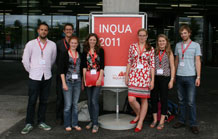
Academic staff, research fellows and postgraduate researchers at the International Union for Quaternary Research (INQUA) Congress in Berne, Switzerland.
‘Quaternary sciences – the view from the mountains’: Exeter Geographers at INQUA 2011.
Held every four years, the INQUA Congress is the major international conference for research into the Quaternary sciences and covers a wide range of topics reflected by the Union’s five commissions on Coastal and Marine Processes, Palaeoclimate, Humans and the Biosphere, Stratigraphy and Chronology and Terrestrial Processes, Deposits and History. The Quaternary is the period of Earth’s history spanning the last 2.6 million years.
Dan Charman spoke on ‘Northern peatland carbon accumulation and climate change during the past millennium’ (abstract) as well as stepping into the breach at the last minute to deliver the talk of an absent colleague! Dan also co-convened a session on ‘Integrating peatland data for past climate and carbon cycle dynamics’. As President of the UK Quaternary Research Association, Dan was also the UK national delegate on the INQUA Council during the meeting.
Tim Barrows presented a keynote on 'Climatic events during the late Pleistocene in New Zealand' (abstract) for the Southern Hemisphere INTIMATE session. Tim also co-presented 5 posters including 'The use of glacier reconstruction and modelling approaches to refine cold-phase Quaternary climates of central southern Africa' (abstract), 'Late Pleistocene glaciation at Lake St Clair, Tasmania, Australia' (abstract) and 'Environmental change in the Willandra Lakes World Heritage Area: Linking human response to environmental change in the semi-arid zone' (abstract).
Matt Amesbury presented research on ‘Holocene land-ocean-atmosphere interactions on the eastern seaboard of North America (PRECIP)’ (abstract) in a session on Quantitative biota-based environmental reconstruction since the last glacial maximum.
The research postgraduates of the Environmental Change research group within Geography at Exeter were very well represented with a group of six swelling the 2000 plus delegates who descended on Berne that week.
Rebecca Rixon presented three posters in different sessions throughout the week and her poster ‘Ice-free areas have existed through multiple glacial cycles on the Antarctic Peninsula’ (abstract) won a coveted student poster prize for which Rebecca received some prize money and a trip to the town hall for a reception with the mayor. Her other posters were entitled ‘First direct chronology of Younger Dryas glaciation in the Outer Hebrides’ (abstract) and ‘First geological constraints on long-term biological refugia on the Antarctic Peninsula’ (abstract).
Tom Roland presented his research on ‘The ‘4.2 kyr event’ in the British Isles: evidence for an abrupt climate event in the North Atlantic?’ (abstract) in the same session as Matt Amesbury.
Eleanor Rainsley presented two posters on different aspects of her ongoing research in Svalbard. They were entitled ‘Testing the potential of in situ cosmogenic exposure dating as a tool for determining relative sea level change: a case study on Brøggerhalvøya, Svalbard’ (abstract) and ‘The extent and thickness of late Weichselian glaciation in Kongsfjorden, western Svalbard’ (abstract).
Lisa Orme presented ‘A record of storminess from the British Isles covering the last 4,400 years’ (abstract) in the session on peatland data co-convened by Dan Charman.
Zoë Thomas presented ‘The Detection Of Tipping Points In Climate Systems’ (abstract) in a session on the causes and processes of abrupt climate change.
Finally, Mark Grosvenor presented his research on ‘Human-Environment-Climate Interactions: The Neolithic Transition In Northwest England’ (abstract) in a session on Geoarchaeology.
Date: 14 September 2011
